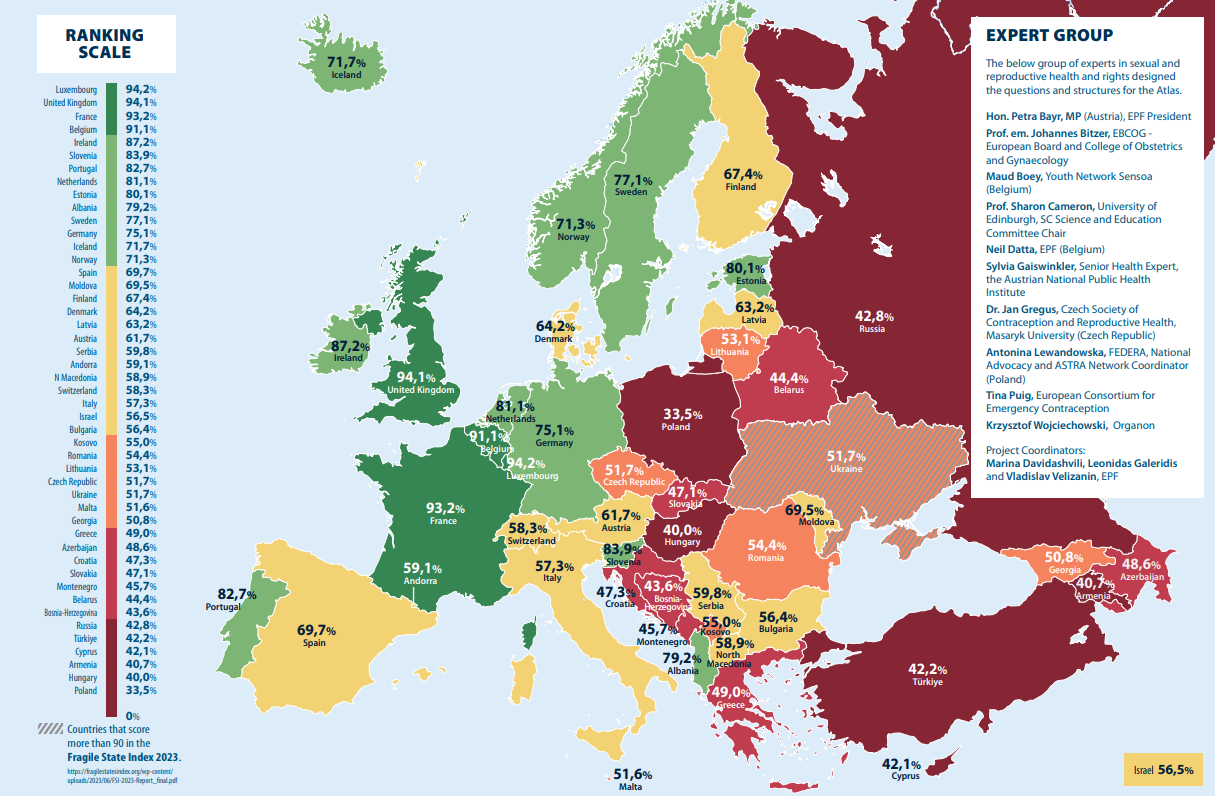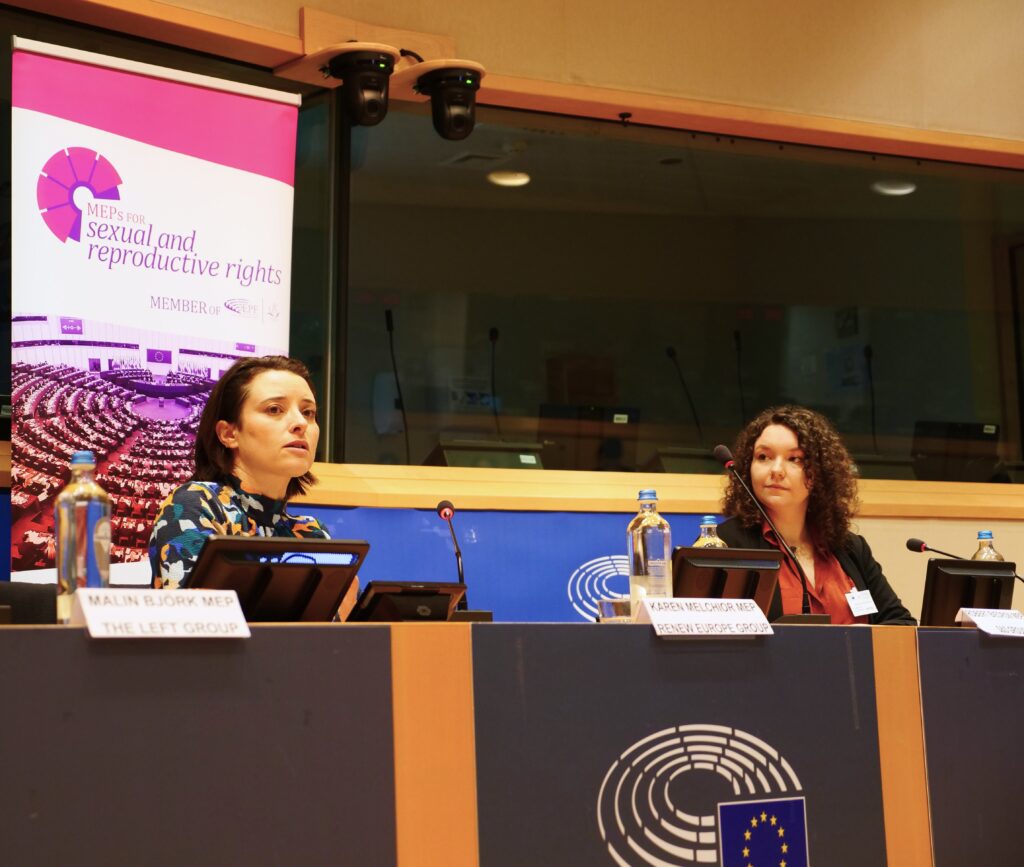
Empowering citizens through contraception
Each year the European Contraception Policy Atlas is published by the European Parliamentary Forum for Sexual & Reproductive Rights (EPF). This week it launched the 7th edition at an event in the European Parliament.
The EPF European Contraception Policy Atlas is an annual report that monitors access to modern contraception in the continent. The report ranks 47 countries (Israel were included for the first time this year), looking at access to supplies, access to counselling and the availability of online information, with each country given a percentage score.
In 2024, the four best performing countries are Luxembourg, the UK, France and Belgium. The lowest ranked countries are Poland, Hungary, Armenia, Cyprus, Turkey and Russia.
In assessing access to contraception, progress is not a linear journey, but one of progress and stagnation. Over the past year, 14 out of 47 countries have improved, while 5 have experienced setbacks and 27 have remained the same. The European Contraception Policy Atlas shows the complexity and the need for concerted efforts to ensure SRHR for all.”
Neil Datta, Executive Director of EPF
Polarised access to contraception
A quick glance at the map again shows a clear distinction between the rankings of Eastern and Western Europe. Northern and Western Europe contains many more green countries, indicating a good ranking whereas Eastern Europe is largely red.

EPF Executive Director, Neil Datta, introduced the map to the audience and discussed some of the key findings. He pointed out that it is unsurprising to find the top performing countries clustered in North-western Europe but commented that those with poor ranking had nothing to do with finances and everything to do with political will. This is borne out by our Gilead Watch campaign, which tracks pronatalist policies around the world and features four of the bottom six countries: Poland, Hungary, Turkey and Russia.
Some of the positive aspects shared by the best performing countries were contraception coverage schemes within national health systems, accessible and free consultations, excellent government-supported websites and free or partially covered over-the-counter emergency contraception. The worst performers had no coverage for adults included in their national health services, no government websites and, in the case of Poland, emergency contraception that was only available with a prescription. Given that it is a time-sensitive method of contraception this vastly reduces its efficacy.
In seven years, Luxembourg has increased its score from 60.9 to 94.2 percent. Improvements it has made in the last year centre around the implementation of a universal contraception programme in April 2023. To supplement that, condoms (which are currently not included in the above programme) have been made widely available in accesible locations free of charge.
Mr Datta finished with three key recommendations for those countries wishing to improve their ranking within the Contraception Policy Atlas.
- Include coverage of contraceptives within the national health system, including Long-acting reversible contraceptives and emergency contraception.
- Ensure there is accessible counselling for contraception, including in rural and hard to reach areas of the country.
- Public health institutions mus ensure information on broad range of modern, effective contraception and where to get it.
The speakers
After a recorded video address from the Minister of Health and Social Services in Luxembourg, the floor was given to three expert speakers to give their insight into the situations in their countries.
First was Robert Biedron, Polish MEP and part of the Progressive Alliance
of Socialists and Democrats European Parliament group. He stated that the new Polish government were devoted to human rights and committed to improving access to contraception. Mr Biedron announced that emergency contraception would soon be available without a prescription, once it had been passed through parliament.
He also spoke about the new Minister for Equality, a brand-new role within the government that signalled their government’s commitment to improving women’s rights. Mr Biedron went on to talk about the obligation Polish politicians now have to make significant changes to abortion access and improve sex education, including for men and boys.

Next to speak was Cristina Puig, Coordinator for the European Consortium for Emergency Contraception. Speaking with over 20 years experience in the field, she made the point that emergency contraception was no silver bullet, but an important part of the overall solution. She made the case for widespread, easy access that is free or low cost (including an interesting look at cost of emergency contraception vs average annual salaries across Europe) and non discriminatory.
The final speaker was Antonina Lewandowska, National Advocacy Coordinator at the Foundation for Women and Family Planning (FEDERA) in Poland. Antonina is a friend of Population Matters and was our Women’s Champion in our 2022 Change Champions Awards.
Although involved in the process of compiling the atlas, it was interesting to hear from an activist at a time when Poland is in a state of flux, having had a change in ruling party in 2023. She was clear that there is a place for statistics and data, but her focus is on the ‘human’ element of human rights, through real stories.
Poland tortures its citizens with corrupt abortion laws.”
Antonina Lewandowska
Among other stories, Antonina spoke about the war in Ukraine and how rape survivors arrived in Poland and it fell completely on NGOs to offer support because there has been no infrastructure in place from the government. She also introduced the paradox of requiring a prescription for emergency contraception. In Poland, the legal age of consent is 15, but parental consent is required to attend a doctor until the age of 18. That means that at 15, 16 or 17, young adults are considered responsible enough to have sex, but not so responsible that they can protect themselves if they were to fall pregnant.
The future
It was great to hear about the potential progress that could be made in the near future in Poland from Robert Biedron and Antonina Lewandowska. But it also highlights how difficult it can be to make essential, human rights-based changes once pronatalist policies have been embedded, even with renewed political will.
This report is always fascinating, and this year Luxembourg really showed how progressive politicians and positive policies can make such a difference. The catch-all universal contraception programme is something that other governments should certainly look to replicate.
More than one speaker also made the direct link between the colours on the map and the general state of democracy in those countries. Those in red have political leaders that impose stricter anti-abortion laws and more restrictive pronatal policies that severely reduce women’s rights. We can only hope that positive changes will be seen in Poland in the next 12 months and it can surge up the ranking. Of course, we will be keeping a close eye on their progress as part of our Gilead Watch campaign.



